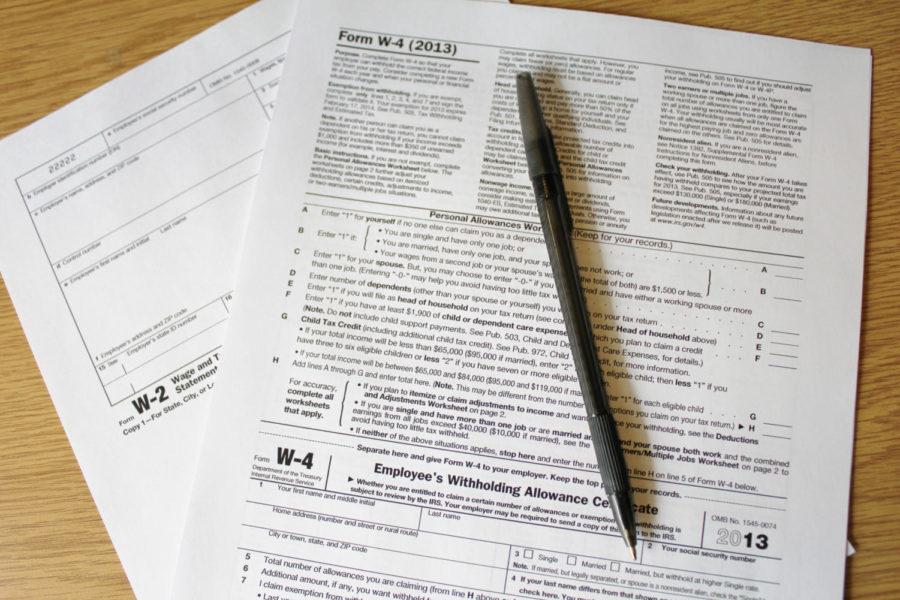Maxwell: Voluntary taxes will fix system issues
Photo: Lindsay Kayser/Iowa State
Tax Preparation
April 20, 2014
April 15 — the date that all federal tax forms are due. Each year at this time most Americans must specify the money they made over the last year and determine if they gave enough of it to the government. Paying taxes is not optional in the United States; unless one’s income meets certain qualifications for exemption, it must be done. However, requiring citizens to pay taxes does not seem to be necessary, and a purely voluntary system would be much better overall.
Our tax system has caused problems since it began. In the United States, asking citizens to pay taxes has not always been required, or even legal. The concept of federal taxes first began with the Revenue Act of 1861, which taxed personal income in order to help with wartime funding. This act was repealed ten years later, and the next attempt at a federal income tax was the passing of the Wilson-Gorman Tariff Act in 1894. Unfortunately, within a year it was ruled unconstitutional. Over a number of years, the constitution continued to made it hard for the federal government to get money from its citizens, so it was changed in 1913. It was at that time the 16th amendment was added to make federal taxes nice and legal.
But there are still many issues with the way we pay taxes. After a very shaky start, federal tax laws have become impossibly confusing. Many accountants charge the rest of us for their ability to interpret the volumes of gibberish and jargon that make up tax laws to determine how much we owe to Uncle Sam. This complicated nature of tax regulations highlights the primary reason people do not look forward to paying taxes: it is boring. We are required to fill out forms, keep receipts and in the end taxes are just another bill for us to pay. Personally, I do not find paying bills very fun.
Another major cause for universal disdain over paying our taxes is that the amount we must pay is not up to us. Tax laws rarely take into account how good you feel about what the government has done for you lately. If I think the government has not been meeting my needs recently, why should I be required to pay all of my taxes? This is akin to demanding a 15 percent tip every time I go out to eat. Like any good waiter, my government should have to earn its paycheck by keeping me happy.
Luckily, most of the problems involved with paying taxes can be solved if we switch to a voluntary tax system. We as citizens should be able to decide how much we want to give to our government each year. Essentially, taxes should be more like donations based on merit. A similar principle is being used on the Internet with increasing popularity is called crowdfunding.
Crowdfunding, used at sites such as Kickstarter, is a system in which a company presents an idea and then agrees to implement that idea if they receive the amount of funding required to do so. This can easily be how we fund our own government.
To make paying taxes more enjoyable, the amount donated could be associated with a tiered rewards program. If someone donates a certain amount, they could get a free American flag, or a free pass good for one free speeding ticket. For larger amounts, you get special thanks during the national anthem, or dinner with Barak Obama. This same idea is very popular with crowdfunding programs.
Additionally, the federal government would gain an easy way to determine what citizens want from it. Accounts could be set up to specify particular support for new services such as a new federal holiday, or the legalization of prostitution. Then whichever areas receive the greatest funding would be implemented. Citizens would no longer feel that they have no say in what their government does, and could invest as much as they want to help make it better.
A voluntary tax system would benefit everyone and greatly simplify the way our government gets our money. We would no longer be required to pay, but would gladly be willing to give back to the nation’s support system, and playing such an active role in how our country works would be a great source of pride as citizens. Most importantly, the entire federal structure of the United States would be at the whim of the people who are part of it.
Such a government would be then constantly held accountable for how it affects its people, and an overall fear of failing to please its own citizens would arise. As socialist John Basil Barnhill [not Thomas Jefferson] said “where the people fear the government, you have tyranny. Where the government fears the people, you have liberty.”







